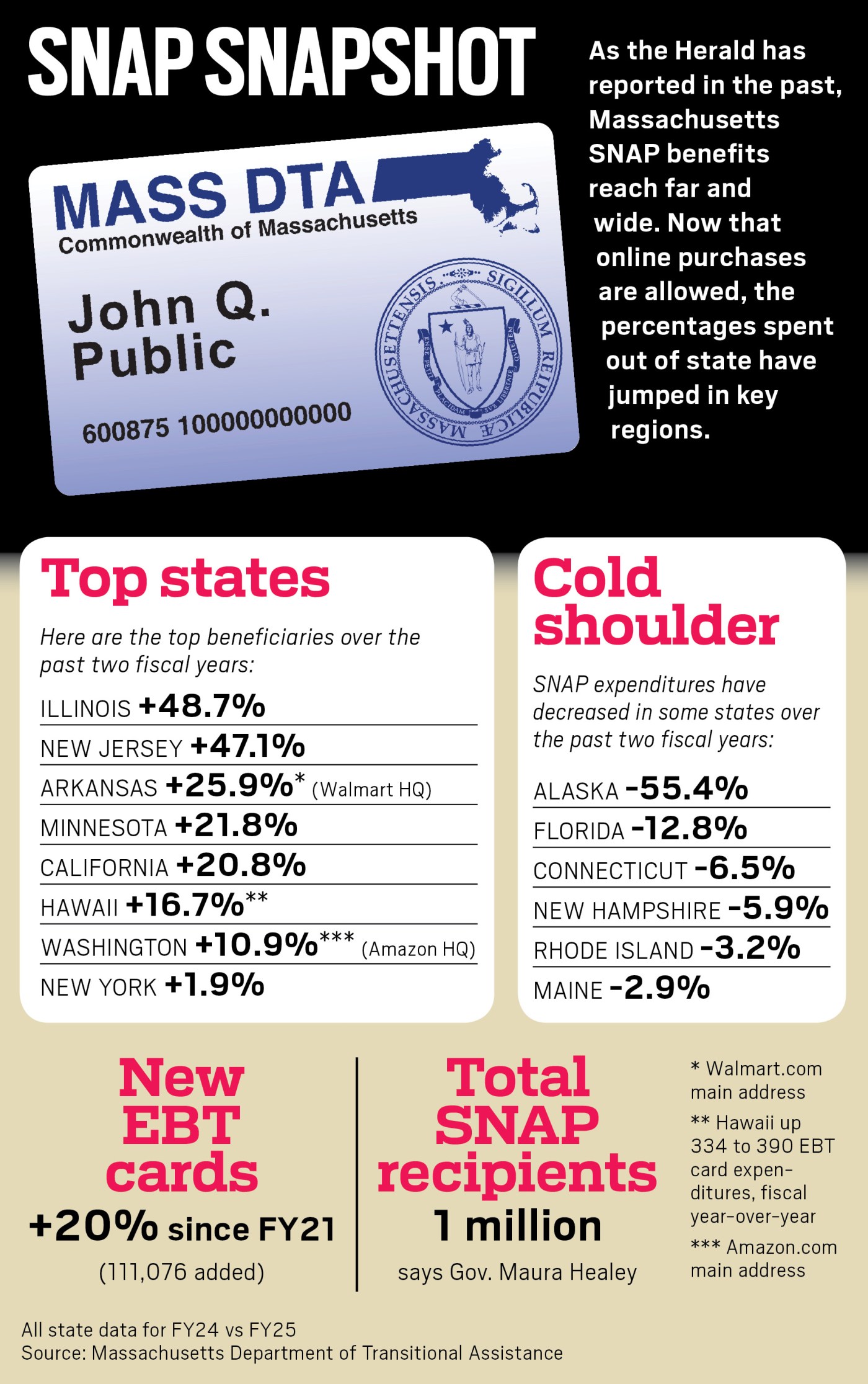Politics
Massachusetts SNAP Spending Surges in Out-of-State Markets

Massachusetts has witnessed a significant increase in out-of-state expenditures through its Supplemental Nutrition Assistance Program (SNAP). As federal discussions consider reforming the program to address issues of waste and fraud, spending has surged in various states, including a notable rise in Hawaii. According to data from the Massachusetts Department of Transitional Assistance (DTA), spending in out-of-state markets has increased by as much as 48.7% in Illinois and 47.1% in New Jersey from fiscal year 2024 to 2025.
During a recent appearance on Newsmax TV, U.S. Agriculture Secretary Brooke Rollins emphasized the necessity of reforming SNAP. He stated that data from predominantly blue states like Massachusetts could help reshape the program, ensuring that benefits are directed to those who genuinely need them. “Everyone that’s taking a taxpayer-funded benefit through SNAP or food stamps must be vulnerable and unable to survive without it,” he noted.
The DTA’s report highlights that other states have also seen substantial boosts in Massachusetts SNAP spending. In addition to Illinois and New Jersey, there were increases of 25.9% in Arkansas, 21.8% in Minnesota, and 20.8% in California. Interestingly, Hawaii saw a 16.7% jump in SNAP spending by Massachusetts residents, raising questions about the motivations behind such out-of-state purchases.
Regional Spending Trends
Despite the growth in out-of-state SNAP spending, several New England states are experiencing a decline in purchases made by Massachusetts residents. Spending in Alaska dropped by 55%, while Florida and Connecticut saw decreases of 12.5% and 6.5% respectively. New Hampshire, Rhode Island, and Maine also reported declines ranging from 2.9% to 5.9%.
Acting DTA Commissioner Michael Cole reassured that out-of-state expenditures remain minimal compared to local spending. He highlighted that SNAP is crucial for over one million Massachusetts residents, contributing approximately $2.7 billion annually to the state’s economy through local retailers and small businesses. Cole also pointed out the importance of online purchasing options for recipients who may be unable to shop in-person due to health issues.
The DTA has explained that the rise in out-of-state spending can often be attributed to the location of retailers’ headquarters rather than the actual point of sale. For example, major retailers like Walgreens and Walmart have their headquarters in Illinois and Arkansas, respectively. This can misrepresent the actual purchasing behavior of Massachusetts SNAP recipients.
Political Reactions and Oversight Concerns
The increase in out-of-state SNAP spending has sparked political debate. Republican gubernatorial candidate Brian Shortsleeve expressed concern over purchases made in states such as Hawaii and California, calling for stricter oversight. He stated, “No one should go hungry, but taxpayers should not be subsidizing out-of-state travel.” Shortsleeve proposed measures to limit out-of-state purchases and verify Social Security numbers to enhance accountability within the program.
Another Republican candidate, Mike Kennealy, echoed Shortsleeve’s sentiments, labeling the rise in out-of-state spending as “deeply concerning.” He noted that with one in seven residents now relying on SNAP, the situation raises serious questions about potential fraud and abuse of the system during Governor Maura Healey’s administration.
Governor Healey responded to the scrutiny by reaffirming her commitment to protecting the interests of SNAP recipients. Following the recent reopening of the federal government, she promptly issued all owed benefits for November. “President Trump might have tried to starve Americans, but I won’t let that happen in Massachusetts,” she stated on social media.
The USDA governs SNAP regulations, outlining permissible purchases, which include fruits, vegetables, dairy products, and non-alcoholic beverages. However, items such as alcohol, tobacco, and hot prepared foods are prohibited. The DTA has indicated that they monitor EBT card usage for compliance with residency requirements.
As discussions continue regarding the future of SNAP and its regulations, the DTA maintains that online purchasing options have been a significant development since their introduction in 2020. The program allows beneficiaries to shop across all U.S. states and territories, but the increase in out-of-state spending will likely remain a focal point for policymakers and candidates alike in the coming months.
-

 Science1 month ago
Science1 month agoIROS 2025 to Showcase Cutting-Edge Robotics Innovations in China
-

 Science2 weeks ago
Science2 weeks agoUniversity of Hawaiʻi at Mānoa Joins $25.6M AI Initiative for Disaster Monitoring
-

 Lifestyle1 month ago
Lifestyle1 month agoStone Island’s Logo Worn by Extremists Sparks Brand Dilemma
-

 Health1 month ago
Health1 month agoStartup Liberate Bio Secures $31 Million for Next-Gen Therapies
-

 World1 month ago
World1 month agoBravo Company Veterans Honored with Bronze Medals After 56 Years
-

 Politics1 month ago
Politics1 month agoJudge Considers Dismissal of Chelsea Housing Case Citing AI Flaws
-

 Lifestyle1 month ago
Lifestyle1 month agoMary Morgan Jackson Crowned Little Miss National Peanut Festival 2025
-

 Health1 month ago
Health1 month agoTop Hyaluronic Acid Serums for Radiant Skin in 2025
-

 Science1 month ago
Science1 month agoArizona State University Transforms Programming Education Approach
-

 Top Stories1 month ago
Top Stories1 month agoIndonesia Suspends 27,000 Bank Accounts in Online Gambling Crackdown
-

 Sports1 month ago
Sports1 month agoMel Kiper Jr. Reveals Top 25 Prospects for 2026 NFL Draft
-

 Business1 month ago
Business1 month agoTruist Financial Increases Stake in Global X Variable Rate ETF









